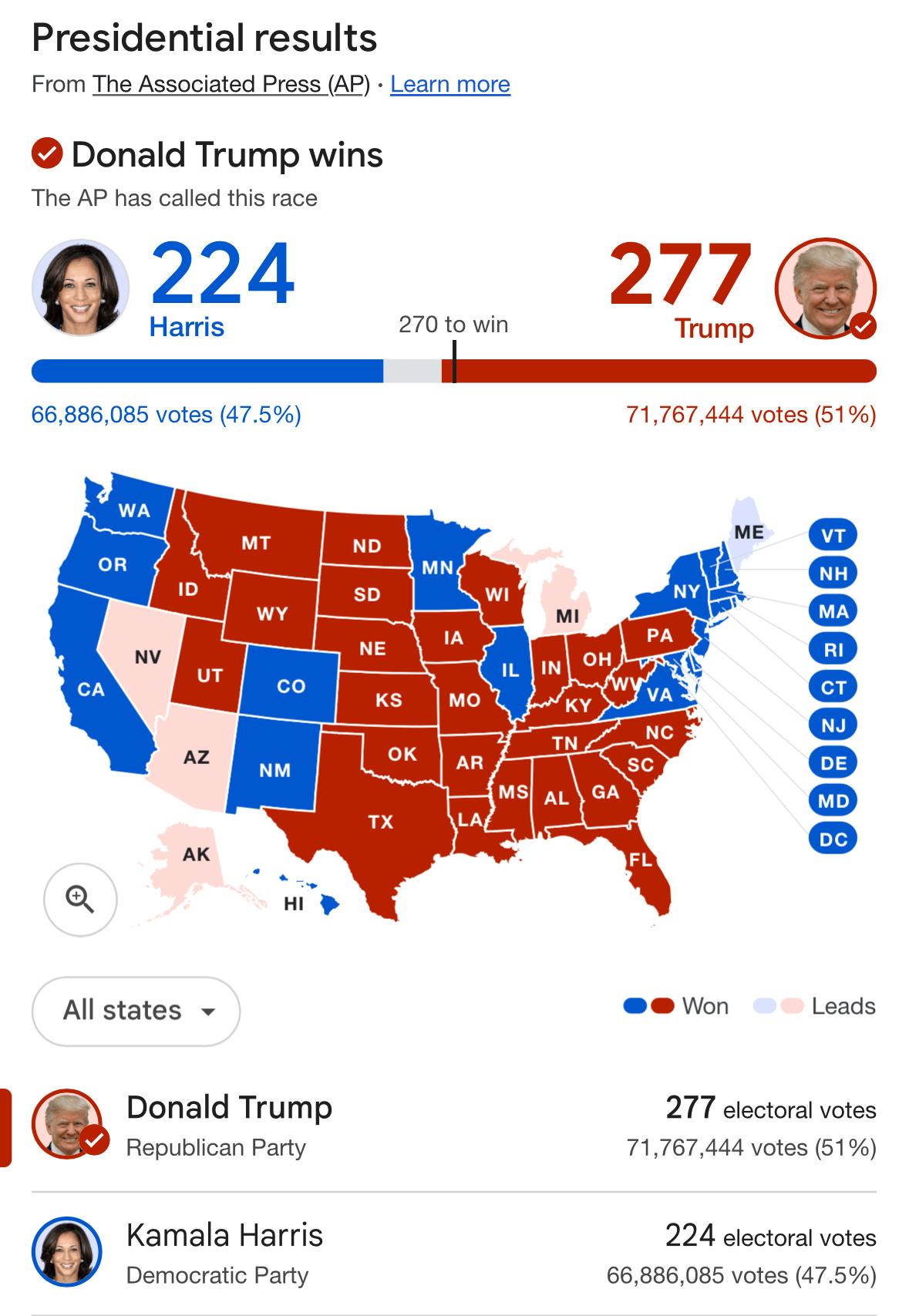When someone shows you who they are, believe them.
America has now voted far-right platforms and policies into the Oval Office twice over. And I’ll admit, this latest defeat stings. It’s heartbreaking, but it’s not particularly surprising. To the point where I’m not even going to sit here and lecture on poor turnout or lackluster campaign messaging or third-party voters. Those talking points will never reach the heart of America’s current problem.
As a girl who grew up in suburban Pennsylvania, whose high school was surrounded on three sides by corn fields and whose parents told her to keep their 2016 vote for Hillary Clinton a secret, I’m anything but surprised that we’ve ended up here. America is many things, but mostly what it is…is divided.
The divide goes so much deeper than red vs. blue, male vs. female, or rural vs. urban. In 2013, a team of researchers and political scientists argued that our political differences might be in our biological nature. On the whole, research into personality shows that conservative-leaning individuals desire security, predictability, and authority more than liberals do. They are also more likely to vote out of fear and defensiveness. Left-leaning voters are more comfortable with novelty, nuance, and complexity.
In a separate study, liberals and conservatives were shown to even have significantly different brain structures. When faced with a “risk-taking task,” Democrats showed significantly greater activity in the left insula—responsible for empathy and compassion. Republicans, on the other hand, showed significantly greater activity in the right amygdala—which processes fear and anxiety. In short, the evidence suggests that conservative brains might be predisposed to respond to external dilemmas defensively, while liberal ones are able to respond with empathy. (What the research does not tell us is whether we are born with these traits, or whether they’re developed based on the political rhetoric we’re exposed to over time).
Lydia Denworth wrote for Scientific American in 2020 that “partisanship does not just affect our vote; it influences our memory, reasoning, and even our perception of truth.” If it feels like we’re living in a separate reality from our political opposites, that might be because…we are.
Trump voters are able to sit comfortably in their support for MAGA policies (even if they “disagree with some of his opinions”) because his camp has been the only one speaking to their deep-seated fears about America’s future. They’ve seen their jobs evaporate, their family businesses get pushed out by Dollar Generals. They’ve been lied to by inflammatory news stations and tech CEOs who point fingers at invisible enemies across borders and behind news site paywalls. They’ve been seeking a hero—someone who will bail them out and look out for them.
It doesn’t take much to know that Trump and his cronies are not going to make life better for the American people. His administration, his government, and his courts will raise tariffs, gut social programs, tear down environmental protections, and strip away the rights of women and LGBTQ+ people. But his conservative talking points and policies are so attractive, in the short-term, for the balm they offer to conservative Americans who fear invasion and moral decay.
I’m not trying to make you feel that all hope is lost; far from it. But in order to correct course (because I really do believe that the moral arc of the universe bends toward justice), we need to be able to hear, understand, and address those fears. There must be an alternative for our conservative neighbors besides a convicted, twice-impeached felon. And until we tap into that need, I don’t know what any liberal candidate could do to win over a majority of the American populace.
Don’t get me wrong; Kamala Harris had the distinct disadvantage of being a black woman in a culture where misogynoir is one of our greatest ideological enemies. But if conservative voters’ greatest flaw is their blind faith in their party leader, then our own faith was our greatest strength. We had faith that Americans could put their weight behind a black woman to defeat a rapist and insurrectionist who was endorsed, full-stop, by the KKK. We had faith that our neighbors and family members would actually listen to the apprehensions of women, queer people, minorities, immigrants, and concerned citizens. We had faith that the compassion that we extend to our communities would be repaid in kind.
That compassion must now become our greatest weapon. We must not turn our backs on our neighbors who voted MAGA—especially if we possess the privilege of white skin and are able to safely engage them in thoughtful, good fair conversation.
If you’re screaming at your screen, “We should be past the point of civil conversation!” …I absolutely agree with you. And yet, we’re here. We will soldier on, just like we did in 2016 and 2022. Take time to cry, scream, vent, and make provisions for the future. We will get back up again, and as we do, we must find the missing piece to the puzzle. Be it a return to shared community values or a revival of “love thy neighbor” sentiment, I really do believe that America has shown us that its true colors are more red than blue.
If that’s to be our reality, we must lead with compassion and create the change we want to see from the ground up.







I am more than sad. I just can't believe this nightmare.
Such excellent analysis.